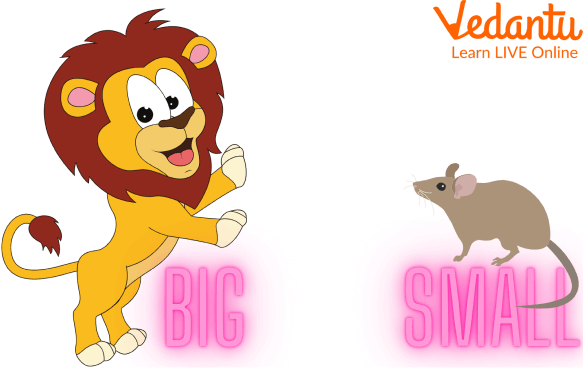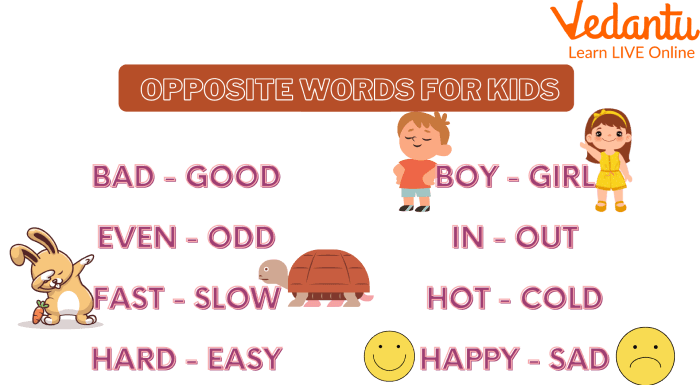




What Are Opposite Words? Simple Definitions and Fun Examples
Antonyms are also referred to as opposite words for class 1. In opposite words, we find and write the contrasting word for the given word. For example, if your teacher asks you the opposite of fat, then your answer would be thin. Opposite words are one of the components of grammar. A teacher can introduce early students to opposite words with the help of contrasting pictures, fill in the blanks and match the following activity.

Opposite Words
In easy language, we can say opposite words are the reverse of something like day and night, hot and cold, dirty and clean and white and black. Sometimes you need to make opposite sentences also like “I like hot tea”, then you could say “I like cold tea” or “I dislike hot tea”.
Ten Easy Opposite Words for Class 1
Narrow - Wide
Opposite - Same
Normal - Strange
Deep - Shallow
Tiny - Huge
Unity - Division
Entrance - Exist
Rich - Poor
Shiny - Dull
Left - Right
Opposite Words for Class 1 with Pictures

50 Opposite Words for Class 1
Big – Small
Happy – Sad
Hot – Cold
Up – Down
Fast – Slow
Tall – Short
Inside – Outside
Day – Night
Open – Close
Full – Empty
Soft – Hard
Good – Bad
Wet – Dry
Far – Near
Heavy – Light
Strong – Weak
Left – Right
Clean – Dirty
Start – Stop
High – Low
Old – New
Easy – Difficult
Bright – Dark
Sweet – Sour
Front – Back
Early – Late
Same – Different
Thick – Thin
Rich – Poor
Brave – Cowardly
Slow – Quick
Alive – Dead
Big – Tiny
Happy – Angry
Laugh – Cry
Buy – Sell
Above – Below
Sit – Stand
Love – Hate
Push – Pull
Come – Go
Empty – Full
Old – Young
Give – Take
Wet – Dry
Pretty – Ugly
Loud – Quiet
Long – Short
Weak – Strong
Open – Shut
Easy Opposite Words Class 1
The opposite words A to Z are given.
A-Letter:
Above - Below
Asleep - Aawake
Ally - Enemy
B-Letter:
Bad - Good
Back - In front of
Big - Small
C-Letter:
Cold - Hhot
Calm - Angry
Careful - Careless
D-Letter:
Dry - Wet
Deep - Shallow
Dark - Light
E- Letter:
Empty - Full
Enemy - Friend
F- Letter:
Fat - Thin
Fancy - Plain
Fix - Break
G-Letter:
Girl - Boy
Giant - Dwarf
H-Letter:
Hate - Love
Hot - Cold
I-Letter:
In - Out
Inside - Outside
J-Letter:
Junior - Senior
K-Letter:
Kind - Cruel
L-Letter:
Large - Small
Lazy - Active
M-Letter:
Marked - Unmarked
Man - Woman
N-Letter:
No - Yes
Night - Morning
O-Letter
Off - On
Out - In
P-Letter
Pull - Push
Pass - Fail
Q-Letter
Queen - King
Quiet - Loud
R-Letter
Right - Wrong
Rainy - Sunny
S-Letter
Slow - Fast
Soft - Hard
T-Letter
Take - Give
Tall - Small
U-Letter
Ugly - Beautiful
Under - Over
V-Letter
Vacant - Occupied
Victory - Defeat
W-Letter
Wet - Dry
Warm - Cold
Y-Letter
Yes - No
Yesterday - Tomorrow
Some More Opposite Words
Some commonly used Opposite words in English for Class 1 are as follows.
Opposite Word for Clean
Cleaning is very important for us, we and our surroundings should be clean. The opposite word is dirty . Let us learn the opposite word of clean with one activity.
Write the Opposite of the Sentence: My house is so dirty, the opposite of this sentence is “My house is so clean”.
Opposite Word for Heavy
You get the feeling of heaviness after eating too much delicious and tasty food. You do not like lifting your heavy bag home from school. Heavy opposite word for class 1 is light. Write the opposite of the given sentence: I like heavy jewellery, the opposite of the given sentence is “ I like light jewellery”.
Opposite Word for Little
I don't like tasty food in small amounts. All we want are our favourite things in a large amount. Little Opposite word is large. Write the opposite word of the given sentence: I want a little amount of sugar in my tea, the opposite of the given sentence is “I l want a large amount of sugar in my tea.
Opposite Word for Narrow
You see small and narrow streets in your neighbourhood every day. We say, “he is narrow-minded”. The word narrow is related to the word small. The narrow opposite word is broad. The streets were broad. He is Broad-minded.
Opposite Words Related to Personality
Some commonly used opposite words in English for class 1 related to personality are as follows.
Tall - Sshort
Fat - Thin
Big - Small
Shy - Bold
Brave - Coward
Funny - Serious
Honest - Dishonest
Cruel - Kind
Skinny - Fat
Lazy - Active
Summary
Opposite words are part of grammar in which students teach contrasting words. Opposite words are also known as antonyms. Opposite words for Class 1 are one of the Grammar activities. The teacher can use many tools to teach students opposite words like matching activity, picture activity, fill in the blank activity, etc. Students get aware of the opposite words in early classes. Opposite words help children in comparison and increase their English vocabulary. The teacher should first introduce class 1 students with simple and easy opposite words, like day-night, hot-cold, love-hate, big-small, girl-boy, etc. This will help students to learn opposite words easily.
FAQs on Opposite Words for Class 1: Easy List With Pictures and Examples
1. What are the 50 opposite words for class 1?
Here are 50 opposite words for Class 1:
- big - small
- hot - cold
- open - close
- up - down
- in - out
- happy - sad
- fast - slow
- full - empty
- day - night
- wet - dry
- light - dark
- old - new
- front - back
- on - off
- over - under
- start - stop
- push - pull
- right - left
- hard - soft
- early - late
- healthy - sick
- short - long
- sweet - sour
- kind - cruel
- give - take
- deep - shallow
- young - old
- dirty - clean
- tall - short
- thick - thin
- beautiful - ugly
- rich - poor
- same - different
- before - after
- empty - full
- out - in
- laugh - cry
- girl - boy
- strong - weak
- heavy - light
- sit - stand
- buy - sell
- open - shut
- above - below
- north - south
- quiet - noisy
- inside - outside
- first - last
- go - stop
- left - right
2. What are the 20 opposite words?
20 opposite words for Class 1 students are:
- big - small
- hot - cold
- up - down
- in - out
- open - close
- happy - sad
- fast - slow
- full - empty
- night - day
- wet - dry
- light - dark
- old - new
- on - off
- start - stop
- push - pull
- right - left
- hard - soft
- early - late
- clean - dirty
- short - long
3. What are the 30 opposite words?
30 opposite word pairs for Class 1:
- up - down
- hot - cold
- big - small
- open - close
- in - out
- happy - sad
- fast - slow
- full - empty
- day - night
- wet - dry
- old - new
- slow - fast
- on - off
- above - below
- push - pull
- right - left
- hard - soft
- early - late
- young - old
- short - long
- light - dark
- weak - strong
- before - after
- front - back
- give - take
- over - under
- clean - dirty
- open - shut
- buy - sell
- quiet - noisy
4. How to teach opposites to grade 1?
Teaching opposites to Grade 1 students is most effective through:
- Visual aids: Show flashcards or pictures.
- Games: Play matching or memory games using pairs.
- Stories: Use short stories featuring opposites.
- Real-life examples: Show 'hot' and 'cold' objects, up and down actions.
- Practice worksheets: Let children connect or match pairs.
5. What are opposite words?
Opposite words are pairs of words with completely different or contrary meanings, such as hot-cold or big-small. Learning opposites helps Class 1 children understand word meanings and improves vocabulary.
6. Why are opposite words important for Class 1 kids?
Opposite words help children:
- Expand vocabulary
- Understand word meanings
- Improve language skills
- Enhance comprehension
7. How many opposite words should Class 1 students learn?
Class 1 students should learn around 20–50 basic opposite word pairs. These include everyday adjectives, verbs, and nouns that help them develop foundational language and communication skills in simple contexts.
8. Can you give 10 opposite word pairs for beginners?
10 simple opposite pairs for beginners are:
- big - small
- hot - cold
- in - out
- open - close
- up - down
- happy - sad
- fast - slow
- full - empty
- night - day
- wet - dry
9. What activities help kids learn opposite words?
Activities to help:
- Matching games with opposite cards
- Singing songs about opposites
- Acting out opposite actions (sit/stand, open/close)
- Storytelling with opposite pairs
- Drawing or coloring opposite pictures
10. Where can I find resources to teach opposites to Class 1 students?
You can find resources like worksheets, flashcards, songs, and interactive games on educational websites, school textbooks, and teachers’ resource platforms. These help make learning opposites engaging and easy for Class 1 kids.
11. How can parents help kids practice opposite words at home?
Parents can:
- Ask daily questions ("Is this hot or cold?")
- Read picture books with opposites
- Play matching games
- Use toys to act out pairs (open car/close car)
- Praise correct use of opposites















